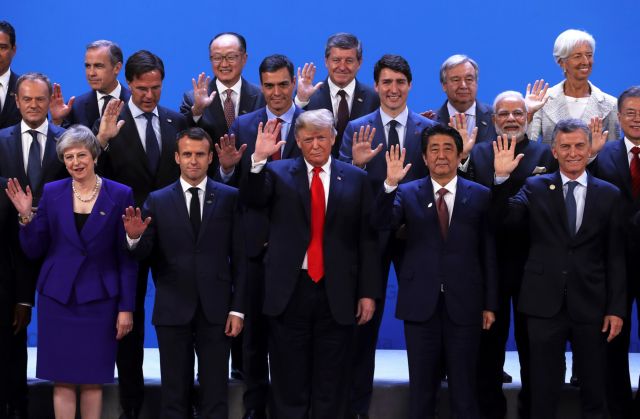The days of rage and growing violence in Paris are neither simple nor routine, especially since the violence and clashes are repeated every weekend.
Combined with the flowering of various forms of populist nationalism and of a left-wing populist, anti-systemic stance throughout Europe, the US, and elsewhere, one gets the impression that something has gone very much awry in the world.
Unrest is growing internationally, and there is great fluidity in the global economy.
Matters are further complicated by the fact that US President Donald Trump has triggered waves of protectionism and a particular brand of nationalism on the world stage.
We already have the first hostage of the undeclared trade war between the US and China, and there is no sign of reconciliation or peace-making. Instead, there are even more loci of tension and clashes.
Meanwhile, social fissures are deepening due to the actions and influence of multinational giants, which maximally utilise new technologies and exploit the loopholes in countries’ national legislation, pushing down prices and wages and imposing the terms of a super-profitable competition. Thus, they deprive local economies of their energy and governments and societies of crucial tax revenues.
International analysts compare our area to the inter-war period and some characterise it as revisionary.
There is a common conviction that the general political, social, and economic conditions – combined with pressures from growing migrant flows and chasms in education and culture that are widening in Western societies -permit the emergence of extra-systemic forces and test the endurance of the old and until recently dominant centre-right and centre-left parties pretty much everywhere, and certainly in Europe.
These realities imperil the post-war values of peaceful coexistence and sustainable growth.
It is no coincidence that IMF chief Christine Lagarde felt it necessary to warn of a new era of rage due to growing inequality and to the widening chasm between rich and poor.
Lagarde underlined that at this rate, inequalities in 2040 will be greater than those in the post-1850 golden age of capitalism. While the longevity of those in privileged groups will be 120 years, others will suffer in poverty. She issued a plea for a new international cooperation that will be strong enough to avert an onslaught of rage and bitterness.
Right now, throughout Europe there is a muted social current. In France, the yellow vests protesters are shouting that they want baguettes and not crumbs. They are threatening President Emmanuel Macron, are isolating the French right-wing, and are highlighting the role of Marine Lepen and Jean-Luc Melenchon.
Italy is under the influence of Matteo Salvini. In Germany, the CDU and SDP, which once garnered 80 percent of the vote combined, now barely exceed 40 percent.
In Athens, a seasoned politician some days ago told a closed group that in Europe “the political giants are dying and being replaced by political dwarfs and that impact son developments”. He hastened to assert his belief that Greece’s recent and unfortunate experience confirms that view.
Indeed, the country has lost out and continues to do so. It is in danger of once again falling into a cycle of corrosion, because it was first in Greece that supercilious political forces of imprudence, self-deception, and illusion won the day.
With the same irresponsibility and lack of foresight that they handled the crisis, they are now again managing in a short-sighted manner the “blood-stained super-surpluses”.
Unfortunately, the country will not be able to endure the coming revisionist years if it does not acquire a rational, inspired, and visionary leadership. It needs a leadership that can deal with the complexities and dangers of a grave new world.





